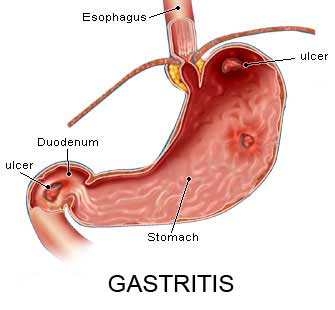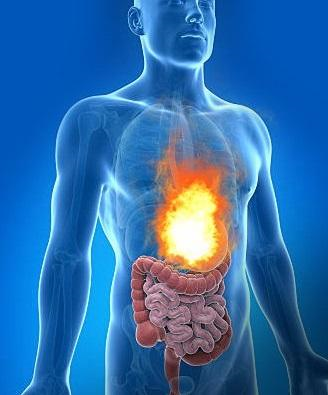
Author: Lawrence Ede, D.O.
GERD is the acronym for gastroesophageal reflux disease. As suggested by its name, GERD is a disease in which acidic stomach contents return to the esophagus, the tube which carries food from the mouth into the stomach. These acidic stomach contents may erode the wall of the esophagus, resulting in variety of symptoms. This condition is primarily due to relaxation of the esophageal sphincter, which is a ring of muscle around the end of the esophagus. In normal circumstances it is contracted, and only relaxes when you are swallowing.

Symptoms of GERD includes heartburn, chest pain, regurgitation, a metallic/sour taste in the mouth and sometimes nausea.
Other manifestations of GERD include chronic cough occurring especially when lying on your back, hoarseness, and wheezing. Complications of the disease include the formation of esophageal strictures, inflammation of the esophagus, Barret's esophagus, and esophageal cancer.
The diagnosis of GERD can often be based on classic symptoms like heartburn and/or regurgitation. However, patients may require additional evaluation if they have alarm features such as an onset of symptoms at age 60 and above, gastrointestinal bleeding, anemia, unexplained weight loss, difficulty with swallowing, pain with swallowing, 5 to 10 years history of GERD, family history of gastrointestinal cancer, or development of complications from the disease.
The management of GERD depends on the frequency and severity of symptoms and the presence of complications. See a health care provider for evaluation and recommendations.
Patients with mild and intermittent symptoms (fewer than two episodes per week) and no complications may benefit from lifestyle and dietary modifications:
- Losing weight if a patient is overweight or obese
- Elevating the head of the bed in individuals with bedtime symptoms of cough, throat clearing and hoarseness
- Eliminating dietary triggers such as caffeine, chocolate, spicy food, food with high fat content, carbonated beverages, and peppermint
Medical therapy of GERD includes antacids, H2 receptor antagonists (such as Pepcid), and proton pump inhibitors (such as Prilosec). Finally, if medical treatment fails, surgical procedures can be considered.
Now let us talk about gastritis! Gastritis is the inflammation (swelling associated with redness) of stomach’s inner lining. There are two subtypes of gastritis, acute and chronic gastritis.

Gastritis is usually caused by infectious agents most commonly helicobacter pylori or are immune mediated (in which the body’s immune system attacks acid-producing cells in the stomach); although in many cases the cause is unknown. Other infections implicated in gastritis include HIV, herpes simplex, cytomegalovirus, and fungal infections. Other factors can include excessive alcohol intake, long-term NSAID (such as Ibuprofen and Naprosyn) use, and stressful scenarios such as sepsis, shock, and trauma.
The typical presentation of gastritis includes upper abdominal pain, nausea, and vomiting. If GERD or gastritis is untreated, it may lead to ulcers, bleeding, anemia, or cancer.
If you have symptoms suggestive of GERD, Gastritis, or stomach ulcers, see a healthcare provider as soon as possible for evaluation and treatment.
Evaluation will include getting more detailed information, a physical exam, and sometimes laboratory tests as well as an endoscopy with biopsy. This procedure involved a physician looking at your esophagus, stomach, and duodenum with a camara embedded in a tube and taking tissue samples.
Treatment may include discontinuing chronic NSAID use, antacids, H2 blockers, protein pump inhibitors, antibiotics, or surgery.
Eating well-cooked food and proper handwashing can reduce the chances of acquiring an H. pylori infection.
In the end, a healthy lifestyle, early diagnosis, and treatment protect your stomach and ultimately add beautiful years to your life.

Dr. Ede is a board certified Family Physician faculty member who sees patients of all ages at Lone Star Family Health Center, a non-profit 501©3 Federally Qualified Health Center operating facilities in Conroe, Spring, Willis, Grangerland, and Huntsville, and serving as home to a fully integrated Family Medicine Residency Program to increase the number of Family Medicine physicians for Texas and our community.



